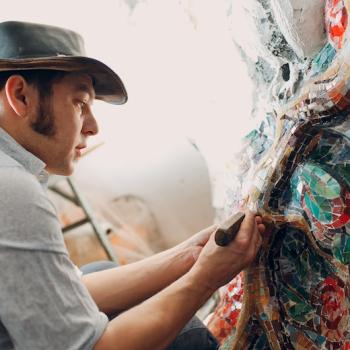
We are in a time. Long before the pandemic, separation and polarization had come to characterize American society—the result of many factors, not least being the media-/now-social-media landscape of the past thirty years. But surely our physical separation from one another since March 2020 has accelerated divisions and suspicions. How on earth did we get here?
As an “everyday theologian,” I try to wrap my head around what I see, to give contour to a problem in order to understand, especially from an inner-life or spiritual perspective. What I notice most is that people are looking for meaning, looking for answers—even as our old ways of constructing meaning and answers fade. In the vacuum created by the fading of the old ways, and the vacuum created by people’s disconnection from and distrust of institutions, various movements gain ascendancy. In the United States in the past several years, white nationalism—also called ‘Christian nationalism’—has been principal among them.

Trends I See
I observe these trends:
~ The mind-blowing pace of technological, societal, and environmental change has led to collective unease.
~ During times of unease and rapid change, people look for easy answers to questions of purpose and meaning.
~ Increasingly Americans are disconnected from dominant institutions that formerly lent people accessible answers to complex questions (often simplistic answers, unfortunately).
~ In the vacuum created by the fading of institutions, arise movements and groups to which people gravitate for answers.
~ White grievance and white anxiety in the face of societal change and the fading of institutions by which white people formerly enacted domination have strengthened the movement of white nationalism/Christian nationalism/white ‘evangelicalism,’ so that more whites in the U.S. identify with this movement and identify as ‘evangelical’ since 2016 than before 2016, and it seems a political moniker at least or more than a religious one (see the research HERE).
~ With the rise of Trumpism, one of the two major political parties in the U.S. has become increasingly dominated by white nationalism and autocratic tendencies.
~ The covid-19 pandemic accelerated polarization, separation from one another, and separation from institutions like religious, organizational, or other community groups, as people distanced from one another for the sake of community health.
This is the lay of the land, as I see it—the “how we got here.” It is one person’s perspective, and I realize others we will see things I don’t. But these facets have come clear for me. The roots of the problem run deep. Indeed, the roots in institutional racism and white domination are as old as the country itself. The roots in the rise of virulently partisan media are newer. Roots in the rapid demise of institutions and organizations are also relatively new.
We all have a role to play in shedding light on the truth and advocating for the common good, for democracy—clearly one of the victims in this struggle, and to re-join what has been torn asunder.
As a clergy person and thinker/writer about religion, I reflect on the lay of the land from this perspective. Re-ligionmeans “to re-join” or “re-connect.” Historically, religion has played this role in societies, both connecting people to a sense of meaning and to one another. Religion continues to play this role, but in an increasingly polarizing way, building strong bonds between people within siloed, homogenous groups. Here, I’m not just talking about participation in dominant faith traditions. As I often explain, I contend that all people have a religion. We all have meanings systems; and our sacred constellations of stories, values, and practices constitute our religions. More and more, people’s religions revolve around things other than dominant faith traditions.
I see a challenge for my own religious group—namely progressive Christianity—to do a better job at offering accessible answers to people’s questions about meaning and purpose, to questions arising from the anxieties of our rapidly changing world. Answers that are accessible without being simplistic, that re-join people to something larger than themselves without increasing divisions and ‘re-connecting’ people in increasingly siloed, homogenous groupings.
People are anxious. No matter what our religions or our sacred narrative structures, we are all—during this time of crumbling—challenged to ask both how our religious worldviews offer accessible answers, and how they might offer healing of divisions, widening our hearts to encompass change, diversity, and uncertainty—because change, diversity, and uncertainty are not going away. I admit: I’ve always been more comfortable with questions than answers. Yet I do believe certain things. There are in fact ‘truths self-evident’ to me that orient my heart and mind in the midst of uncertainty. I ask myself (and challenge you to ask yourself): Am I sharing my truths in such a way—clearly, passionately, honestly—that they might offer solace to others and healing to our brokenness?
Wren, winner of a 2022 Independent Publishers Award Bronze Medal
Winner of the 2022 Independent Publisher Awards Bronze Medal for Regional Fiction; Finalist for the 2022 National Indie Excellence Awards. (2021) Paperback publication of Wren , a novel. “Insightful novel tackles questions of parenthood, marriage, and friendship with finesse and empathy … with striking descriptions of Oregon topography.” —Kirkus Reviews (2018) Audiobook publication of Wren.


















